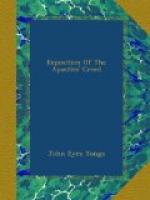original do not express it so strongly as those of
the English version: “I know that my redeemer
liveth, and that he shall stand at the latter day upon
the earth: and though after my skin worms destroy
this body, yet in my flesh shall I see God."[213]
In the Psalms there are various intimations that faithful
servants of God looked for a future life in which the
body as well as the spirit should find place.
Isaiah prophesied, “Thy dead men shall live,
my dead body shall arise. Awake and sing, ye that
dwell in dust: for thy dew is as the dew of herbs,
and the earth shall cast out the dead."[214] Daniel
still more emphatically declares, “Many of them
that sleep in the dust of the earth shall awake, some
to everlasting life, and some to shame and everlasting
contempt."[215] The story in the second book of Maccabees
of the seven martyr-brothers, who would not accept
life from the tyrant on condition of denying their
God, proves that they were strengthened to endure
by the sure hope of “a better resurrection.”
One of them thus confessed his faith: “Thou
like a fury takest us out of this present life, but
the King of the world shall raise us up, who have
died for His laws, unto everlasting life.”
Another of the brothers, about to have his tongue
plucked out and his hands cut off, “holding
forth his hands manfully, said courageously, These
I had from heaven ... and from Him I hope to receive
them again.” Their mother, who is thought
to have been one of the saints that in the Epistle
to the Hebrews are said to have been tortured, not
accepting deliverance, encouraged her sons to be faithful
unto death by telling them that God who had given
them life at the first would restore it. “I
am sure,” she said, “that He will of His
own mercy give you breath and life again as ye now
regard not your own selves for His laws’ sake."[216]
The Pharisees in the days of our Lord held by the doctrine,
which the Sadducees, who rejected belief in angels
and spirits, denied. The belief expressed by
Martha when she said of her brother Lazarus, “I
know that he shall rise again in the resurrection at
the last day,"[217] was in all likelihood current
in her time. It may have been to impress the
truth of resurrection-life for the body that Enoch,
before the flood, and Elijah, in later Old Testament
times, were translated; but it is in the New Testament,
in words spoken by the Lord Jesus, that resurrection
is fully revealed. “Marvel not at this,”
said He to the Jews; “for the hour is coming
in the which all that are in the graves shall hear
the voice of the Son of man, and shall come forth;
they that have done good, unto the resurrection of
life; and they that have done evil, unto the resurrection
of damnation."[218] In reply to the Sadducees, who
attempted to ridicule His statements regarding resurrection,
He said, “Ye do err, not knowing the Scriptures,
nor the power of God";[219] and He put them to silence
by showing that the truth of resurrection was implied
in the name by which God revealed Himself to Israel,




